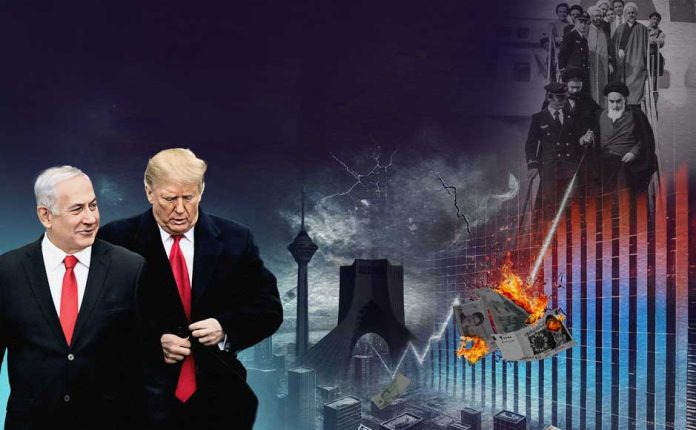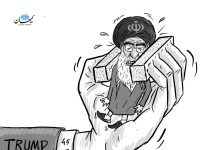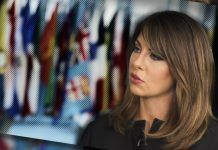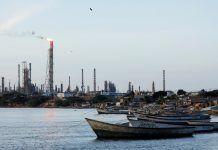By Ahmad Rafat
On the eve of the 46th anniversary of the victory of the Islamic Revolution, led by Ruhollah Khomeini, and shortly after U.S. President Donald Trump released a National Security Presidential Memorandum (NSPM) announcing new sanctions on the Islamic Republic, Iran’s Supreme Leader Ali Khamenei reiterated his strong opposition to any talks with the U.S.
Ayatollah Khamenei Says Experience Proves Talks With US ‘Not Smart’
In a speech on Feb. 7 to the commanders of the Islamic Republic of Iran Air Force (IRIAF) and the Islamic Republic of Iran Air Defense Force, Khamenei referenced Trump’s withdrawal from the 2015 Joint Comprehensive Plan of Action (JCPOA), also known as the Iran nuclear deal, in May 2018, and the ongoing sanctions, emphasizing “that negotiations with such a government will not solve the country’s problems.”
“They should not pretend that sitting at the negotiating table with that government will resolve certain issues. No. Negotiating with America will not solve any problems,” Khamenei asserted.
Referencing the 2015 nuclear deal between Iran and the P5+1 (China, France, Germany, Russia, Britain, and the U.S. plus Germany), which resulted from two years of negotiations, Khamenei stated: “However, the Americans failed to implement that agreement, and this very person [Trump], now in charge, tore it up.” Khamenei was explicitly referring to Trump’s decision to withdraw from the JCPOA in 2018 during his first term as president.
Khamenei’s opposition to talks with the U.S. comes as President Trump, in a joint press conference with Israeli Prime Minister Benjamin Netanyahu in Washington on Feb. 5, reaffirmed his goal of reaching an agreement with the Islamic Republic. He expressed hope that he would not have to implement the NSPM’s provisions fully. Trump also signaled a willingness to meet with the Islamic Republic’s president, Massoud Pezeshkian, and envisioned both leaders signing an agreement.
Ayatollah Khamenei Meets Senior Hamas Leaders in Tehran, State TV Says
In remarks to reporters in the Oval Office, Trump warned that if the Islamic Republic attempts to have him assassinated, he would “order its obliteration.”
In the 46 years since it was first established, the Islamic Republic has left Iran in such a state that even factions and figures within its system are speaking out. They openly call for fundamental reforms to ensure the regime’s survival, and they caution that society is on the verge of collapse.
In this context, the Islamic Republic might consider accepting Trump’s negotiation proposal and a deal with the U.S. as a potential strategy to secure its future. At the same time, Trump’s conditions for an agreement may undermine the regime’s very identity — potentially triggering internal resistance that could push the system into an even deeper crisis.
While the Trump presidential memorandum primarily addresses the Islamic Republic’s nuclear program, it also calls for the regime to end its regional activities, including support for terrorist groups, and briefly touches on issues like human rights violations and the taking of foreign and dual national hostages.
In the days before Netanyahu’s visit to Washington, there was widespread speculation about the topics to be discussed during his talks with Trump at the White House.
Contrary to expectations, Israeli and some American sources reveal that the focus of the discussions was Gaza and the expansion of the “Abraham Accords,” signed during Trump’s first term, which resulted in the establishment of diplomatic ties between Israel and several Arab nations, including the United Arab Emirates (UAE), Morocco, and Bahrain.
The current U.S. administration is now working to create the conditions for establishing diplomatic relations between Saudi Arabia and Israel.
Trump’s aspirations for negotiations with the Islamic Republic, alongside Khamenei’s rejection of any agreement with the U.S., come when Iran will mark the 46th anniversary of the Islamic Revolution on Feb. 11.
Today, 46 years after Khomeini’s followers triumphed and the Islamic Republic was established, Iran stands as an economically crippled nation, with the regime’s legitimacy in decline. These 46 years reflect a period of regression for Iran.
Rebuilding the country will require years of financial and human resources, especially after transitioning from the current regime.
A quick look at the national currency, the rial, a key indicator of a nation’s economic health, reveals a sharp depreciation. The value of the dollar surged immediately after the announcement of the NSPM. Economic experts are confident that by the end of the Iranian year (March 20), the dollar could rise by another 20 percent.
Should negotiations between the U.S. and the Islamic Republic begin, there may be hope that the dollar’s value could decrease in the coming months, ending the steady rise in the exchange-rate value of the dollar in recent years.
The devaluation of the rial and the rise of the dollar, while potentially benefiting insider groups linked to the Iranian regime, are key factors exacerbating poverty in Iran.
A new study in the Tehran-based newspaper Donya-e-Eghtesad shows that 46 years after the Islamic Republic’s founding, food insecurity affects more than 55 percent of Iran’s urban population.
The report also noted that the daily calorie intake for these individuals is more than 15 percent below the necessary minimum. Additionally, meat consumption has dropped by 50 percent per capita in the past five years.
Doctors warn that the reduction in meat and dairy consumption is a significant factor behind stunted growth in Iranian children and adolescents. Ultimately, the ongoing economic crisis threatens the future of an entire generation that should be shaping Iran’s destiny.
Over the past 46 years, the destruction has not been limited to just the economy.
Inefficient management, nepotism, and the dominant role of the Islamic Revolutionary Guard Corps (IRGC) in economic affairs have also severely harmed the country’s water resources, which are crucial for its survival.
A striking example is the condition of the wetlands. Official data shows that 42 percent of the nation’s wetlands have entirely dried up, contributing to dust storms. Although the “Protection, Restoration, and Management of Wetlands Law” was enacted five years ago, no water has returned to these dry wetlands, and their number has only grown.
The Islamic Republic’s track record in the last 46 years also includes a dire human rights situation, a sharp rise in death sentences, and the erosion of fundamental social and individual freedoms, such as the right to freedom of religion, belief, and even personal dress.














